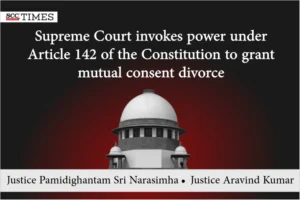Supreme Court: In a transfer petition concerning divorce, the division bench of Pamidighantam Sri Narasimha and Aravind Kumar, JJ. by invoking its power under Article 142 of the Constitution of India, granted divorce to the parties.
The Court noted that the dispute between the parties has been amicably settled. Further, after perusing the Settlement Agreement dated 19-02-2024, the Court viewed that this is a fit case to exercise power under Article 142 of the Constitution of India to dissolve the marriage between the parties. Thus, the Court while dissolving the marriage solemnized between the parties by a decree of divorce under Section 13-B of the Hindu Marriage Act, 1955; passed the following order:
(1) The cases pending between the parties has to be withdrawn by them.
(2) The amount of Rs. 12 lakhs towards full and final settlement has to be paid to the wife by the husband.
(3) The decree of divorce has to be drawn incorporating all the terms and conditions of the Settlement Agreement within a period of six weeks from the date of this order.
Also read:
CASE DETAILS
Citation: Appellants : Respondents : |
Advocates who appeared in this case For Petitioner(s): For Respondent(s): |
CORAM :

